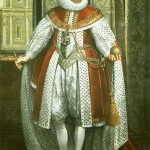This months’ Flower comes from the Order Book of the City of Durham (Durham County Archives ref. Du 1/4/4). James I visited Durham in 1617 on his way to Scotland and was welcomed into the city with all due pomp and ceremony. However, behind the scenes there had been a conflict raging in the city between the Bishop and the civic authorities, with each side accusing the other of encroaching on rights accorded by the Charter.
The speech below was delivered by the Mayor to the King and his retinue on Elvet Bridge on Holy Saturday, 19th April, accompanied by a gift for the King of a silver gilt bowl with a cover. However, later in the day and some distance away a poem was delivered to the King by a city apprentice, and it outlined some of the injustices felt by the civic authorities in a way that could be disowned if necessary. The following speech by the Mayor, then, can be seen as a city’s official welcome of an early seventeenth-century sovereign; the more controversial poem of complaint will feature as a future Flower:

Portrait of James I of England in state robes (1566-1625), oil on canvas, by Paul van Somer, c.1620, from the Royal Collection
‘Most gracious Soueraigne what vnspeakable ioy is
this your highnes presentes, vnto vs your loueing Subiectes
our tongues not able to vtter, nor our meanes to shew your
welcombe, your gracious Maiestie at your happie cominge
hither with much peace and plenty, found this Cyttie
inabled with diuers liberties, and priviledges, all
Soueraignitie and power sprituall and temporall, being in your-
selfe, gaue vnto vs the same againe, and afterwardes of your
Gracious bountie confirmed them, vnder your great Sealle
of England, We humblie beseech your Maiestie, continue your
favour towardes this Citty, And in token of our loue and
Loyaltie, craues the acceptance of The Cup deliuered this Myte, and wee
shalbe readie, to the vttermost expence, of our dearest bloud
to defend you and your royall proginy here on earth, [an]
with your prayers to god, to blesse you and all yours in all
Eternitie.’

